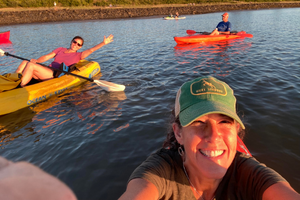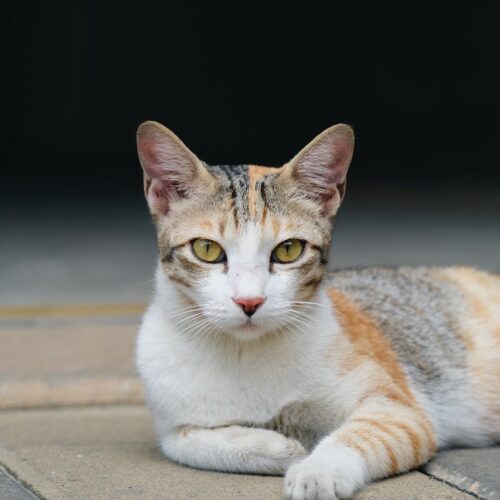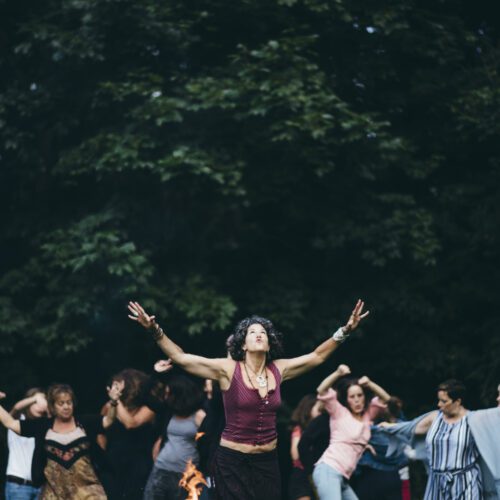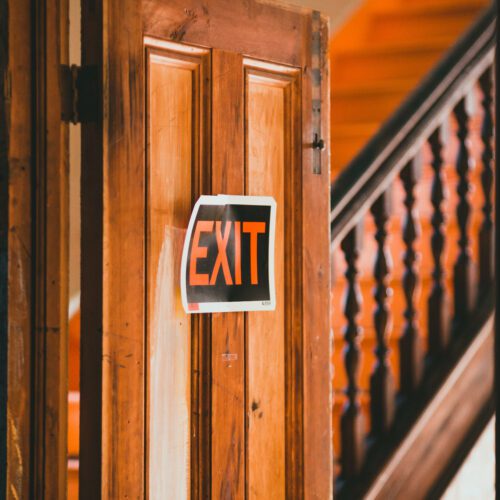How do you know where to go if you can’t see where you are?
This is the question that really lives at the heart of my work with clients. It’s also the question I spend 99% of my own time as I live my way into that answer. I’m popping in to share a recent story about that because it’s kinda comical—and also instructional.
 In late August, I went to a Brandi Carlile concert at this awesome venue right on the water in Portland, Maine. It was a gorgeous summer evening, the Indigo Girls were opening for Brandi, and I went with two awesome humans—my beloved who knows me well and a bestie who’s always up for some live music and an adventure.
In late August, I went to a Brandi Carlile concert at this awesome venue right on the water in Portland, Maine. It was a gorgeous summer evening, the Indigo Girls were opening for Brandi, and I went with two awesome humans—my beloved who knows me well and a bestie who’s always up for some live music and an adventure.
The only problem was….it was a sold out show so we didn’t have tickets.
No problem, we thought—we’d take our kayaks and PADDLE to see the concert from the water, for FREE.
Epic, we thought, as it had this maverick, bootlegger, commando energy that felt a bit rebellious.
The only problem was…my beloved’s truck was in the shop, so we had no way to transport all three of our kayaks (and us) to the drop-in place he had craftily scouted out for us.
No problem, he concluded—I’ve got access to a dump truck at work…we can take that to the river!
Totally, we responded, as the badass vibe of the evening audibly clicked up a few notches.
The only problem was…it would be low tide EXACTLY when Brandi was taking the stage.
For a moment I thought, maybe it won’t be…maybe the tide chart will change that night. Right…
No problem, we decided after scoping out how LOW low tide was the night before…we can do it.
Absolutely, we believed, as we strapped on our rally caps and lashed our life preservers down.
So just to recap the situation if you’re with me so far:
- We were going to a sold-out show and didn’t have tickets
- Our modes of transportation were a big-ass dump truck and then kayaks
- We would be putting in our kayaks for a 3-hr excursion moments before low tide
- Did I mention we forgot bug spray?
You know where this is going, right? Of course you do…
And I think I did, too, after we parked our borrowed dump truck illegally behind a yoga studio, hauled three kayaks down to the river through the marsh grass, and slip-slided over the slime and muck until we could drop each of them into the water.
Once all three of us were in our kayaks, paddling toward the venue with the sun in our faces and a gentle breeze coming off the water (even as the ocean emptied…), I turned to my beloved and my bestie and said:
“I think this is the coolest thing I’ve ever done…I’m saying that now, because I don’t know how this night will end.”
But isn’t that the truth about life?
At any one moment, none of us know what we’re doing or how it will end.
We can choose to see it as an epic adventure and take it paddle by paddle.
Or we can never put our boats in the water and not get in the muck of life—and miss the concert.
What will you choose?
That is the question that lives at the heart of any transition—the thing that comes before the change.
That question has been on my mind this September, in a loop, as there have been so many random shootings in this seaside tourist town I’m living in, and more scary stuff just keeps pouring in daily in the headlines as we make the transition into the fall season.
I’ve heard people comment recently that it seems like everything is broken and falling apart at the same time.
But that night, I just wanted to see Brandi sing her heart out—from the water—even if it was just a teeny weeny creek by the time we got there.
Happily, there seemed to be plenty of water when we arrived at the tip of Thompson’s Point—well, maybe not plenty, but enough to keep our boats afloat. And we weren’t alone.
There were a handful of motor boats that had decided to beach themselves like whales in the muck, tipping jauntily to the side while the happy people on board settled in for the show. There was much merriment out on that water, with people offering to share drinks and snacks as we paddled by.
There were a bunch of kayaks like ours, and a fair number of canoes, even some paddle boards.
We were the water people, and it felt good to belong to this motley crew.
I could sense the “can you believe we got away with this” culture that was among us as the outgoing tide forced us closer and closer together and the water continued to retreat (right on schedule!).
The concert kicked into high gear and hot damn we were there to be a part of it—for free!
It was an epic adventure.
It was a highlight of my summer.
It was an evening I could have missed for so many good reasons, but didn’t.
But then? It was over.
The encores finished, the crowds on land dispersed, and crews started to break down the set.
It was 10:30
And we had to go home.
The only problem was…we couldn’t see anything.
No problem, we had anticipated this and brought headlamps—we could figure this out.
We knew there was a channel where the water came in and left the bay by the point—it’s how the ocean found its way to the river where we first put in our kayaks. But when we looked around, it was just darkness, and lots of it.
We could sense (more than see) a handful of hearty people in kayaks and canoes who had chosen to stay for the end of the concert like we did—and we took solace from the fact we weren’t alone.
But they weren’t going to paddle our boats for us—we needed to find our own way, stroke by stroke.
My bestie, got busy paddling this way and that in the scant 2 inches of water beneath us, essentially polling her kayak throw the mudflats in a search for deeper water which would lead us to the channel.
My beloved, who had quite a few pounds on us both, was frustrated because he felt beached. His kayak was dragging ass more than ours, and he didn’t like the fact that he couldn’t paddle through mud. He announced with some conviction that he was just going to sit his ass there and wait until high tide came back in.
My kayak was in-between theirs, and I paused, torn, not sure who to align with or follow.
My bestie was in motion—even as she couldn’t see where she was or what she was doing, she seemed to be systematically feeling her way forward, pole push by pole push (she was actually the one who inspired the pole push technique…) She seemed determined. Definitely driven, which was probably what was helping her with the mud poling she was doing.
My beloved was beached—a deeply foreign and uncomfortable spot for him, landlubber that he is. Not seeing a way forward, but also not terribly hopeful that there was a way forward or if we would ever make it home (even as his brain knew there was because he had been our trusty scout who told us about the presence of a channel—even at the lowest of low tides).
What ensued over the next hour was a lot of poling around mud, with periodic punctuations of people yelling I FOUND THE CHANNEL exploding in the dark, sometimes from strangers we didn’t know were there.
I would not have wanted to be a waterfront property owner on that particular night trying to sleep with the window open. It was not a particularly graceful moment for us water people—it was slow-going, muddy and loud.
There was much swearing, laughter and grunting. There was even some impromptu peeing.
But mostly? We worked together and kept at it as we found and then lost this serpentine channel again and again in the pitch darkness, trying not to give up hope that somewhere out there was a trickle of deep water that would take us home.
The deep water was not being evasive—it knew where it was at all times. Water is like that.
We were just blind and frustrated we couldn’t see our way forward—humans are like that.
When I reflected on this later, I realized I had fallen for the trap of trying to move in a straight line, as if from A to Z. Each time we found the channel again, I’d be seduced into thinking it wouldn’t move again.
Straight lines, we’re taught, are the most efficient and effect route. Sadly, that’s a misconception about change that many people believe is true.
But transition, like water, never moves in a straight line—it has curves and twists. She changes. That’s the truth.
So why am I telling this story right now?
I wasn’t planning on it, actually. In fact, I was planning on sharing a story I had written LAST week with you—the one I couldn’t share because I ended up having to take my mom to the emergency room when we suspected she was having a heart attack (which she was), and then discovered she tested positive for COVID.
My 83 year-old legally blind mom immediately went into quarantine—away from everyone she knew, not knowing where she was, why she was there, or what would happen next. She was in mud flats.
I got home at 3am from the hospital and learned my eldest son who had just flown out to Colorado to visit a friend was in Quick Care because he had gotten food poisoning. He was in the mud flats.
As we scrambled to pole across the mudflats to help our family members find some deep water, the dishes piled up in the sink—and then the dishwasher broke. Kaput. We were in the mud flats.
I started to wonder how or why I had felt so damn good the week before—was that just my imagination? WAS THAT EVEN REAL?
In the midst of this, a client texted me a quote by Pema Chodrön because SHE was in the mudflats, wondering if she would ever find some deep water. I read it and my eyes filled up with tears because it just felt so…..normalizing, affirming, hopeful.
“We think that the point is to pass the test or overcome the problem,
but the truth is that things don’t really get solved.
They come together and they fall apart.
Then they come together again and fall apart again.
It’s just like that.
The healing comes from letting there be room for all of this to happen:
room for grief, for relief, for misery, for joy.”
Isn’t that just so good?
Thankfully, my mom is now home again and on the mend from that harrowing experience. My son got through a rough start and went on to have a great trip, just like we did paddling that epic adventure night.
As a result, a week later, we all feel kinda badass, kinda proud, kinda of exhausted, and super grateful.
Each of us, in our own way, polled through the mud flats—in our own boats, but working together.
And the thing is? I know our stories are not unique. I’ve been working with clients all week (and communicating with them in text/email outside of sessions). I’ve heard similar stories.
September is kinda like that as we transition from here to there—sometimes cruising along in deep water, sometimes in the mud flats. The tide has gone out, but is not yet fully in.
So if you’re feeling in the mud flats this week, it’s not your imagination if your ass is dragging on the bottom—it’s normal to get frustrated and wonder if you’ll ever get to a better place. It’s okay to pole instead of paddle as you try and find some deep water that will move you forward.
It’s normal to want to move in a straight line—and it’s seductive. That’s how we’re trained.
But in this transitional season, remember how water moves, and follow its lead.
And as we all make our way on this serpentine channel from here to there, let’s work together. There are strangers among you—maybe even right next to you—who are in the same boat, so let them know when you find some deep water of hope.
Extend a paddle.
___________________________
If you want to play a bit more with this, check out my Get Unstuck mini course—it’s free and ready for you to download in a PDF in the blink of an eye.



